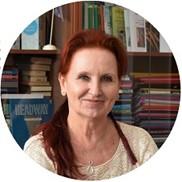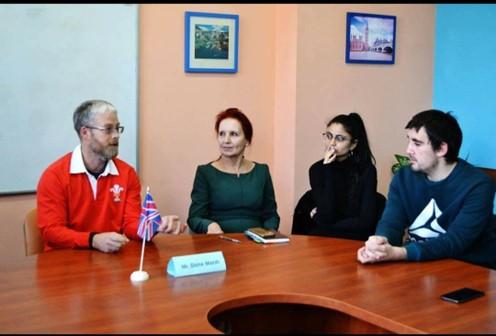ECO_CARE meets Olena Peftieva
November 1st, 2022
ECO_CARE meets Olena Peftieva
By Olena Peftieva
This month we meet Olena Peftieva, a professor and a researcher from Ukraine, whose major passions are linguistic research, translation, and environmental protection. Olena’s work has been crossing the ECO_CARE path via the translation into Ukrainian of «A Story about Knowledge» by Arianna Porrone, Margherita Paola Poto, and Valentina Russo here
and the translation and adaptation of the co-created story «Tarumã, waters that speak» by Giulia Parola and Margherita Paola Poto (forthcoming in the book Parola G., Poto M. P., Tarumã, waters that speak. A Legal Design and Visual Law Project, Co-created by Law Students and the Chiquitano People: The Pollution of the Tarumã River and Its Consequences for the Chiquitano People, Aracne, 2022). here

Photo: Olena Peftieva
Research
- Can you briefly tell us about your research passions?
Cognitive and diachronic linguistics, cognitive semantics, semantic changes, and word formation processes.
- What are the areas/topics/issues in your domain of expertise that need to be explored in the years to come?
Searching the Coinage of New Roots in New Words or Neologisms or Lexical Innovations in terms of diachronicity.
- What is your experience with project applications?
My personal experience with the ECO_CARE project application lies in the dissemination of educational activities using translation to make them accessible to the wider community. The more children will be involved in this educational project today, the more people will care about our planet Earth tomorrow.
- Can you tell us something about the complexity of an academic career to combine research, project applications, and educational duties?
An academic career is a difficult path to overcome. For me, it was a combination of the paid work at the university in the daytime and the research in the evenings at home without any financial support or days off in my university schedule. It was a hobby for which I paid, and it took me long seven years to defend my dissertation.
Teamwork
- Can you tell us something about your teamwork experience?
Teamwork in education is an inherent part of the process where only a team may achieve the goal. University teamwork is full of benefits, you find yourself in a big family, you know the strong and weak features of the colleagues, so you build the relationship with everybody easily. Being a member of a team gives you the feeling of importance and safety.

Teamwork. Dane Marsh from Wales, me, and the students at Mariupol State University
- What do you enjoy about working in a team?
Being supportive of others and if necessary to get support from colleagues.
- Describe a challenging workplace situation. How did you deal with the difficulty to cooperate with others?
Nobody is perfect. If the unpleasant event occurred, I realize that it is due to a personal perception of the situation, and what is left is to find the reason why it happened and avoid such an event in the future. Understanding the situation helps further cooperation and discussion of our mutual plans and objectives.
- According to you, what makes a team successful?
A successful team to me is where each member knows what to do and how to do his or her part, yet constantly cooperating with other members for achieving the common goals.
Diversity and equity
- Describe a time when you found it difficult to work with someone from a different background
I have been working for Mariupol State University for 24 years, all my colleagues were and are from the same background, that’s why I didn’t have such experience.
- Can you think of an example of a situation where you had to take into account the sensitivities of different parties?
I cannot recollect such examples offhand, probably, because I never accentuate my attention upon such cases. I try to treat each person with respect, and as a result, I can get along with individuals different from me.
- How has your education and work experience prepared you for working in a diverse environment?
The acquiring of knowledge is a constant process, so I’m learning all my life and in a different environment. As an interpreter, I worked with Indian and Pakistani specialists at the Coke Oven plant in 1982. As a lecturer, I had an opportunity to share my knowledge and deliver lectures at the National and Kapodistrian University of Athens, Greece in 2019. In 2020 I was a course leader at the international summer school of Coruna University, Spain. I used to invite guests from various countries to participate in our meetings at Mariupol State University. Thus, academic mobility and live communication with representatives from other countries prepared me for working in a diverse environment.
Career and family life
- Can you please tell us about your experience in balancing career and family life?
The most important thing here is to prioritize things. As for me, I tried to find a balance between my family life (priority), work (second place), and leisure time.
- Have you experienced any situation where the competitive academic reality (with high pressure to publish, secure funding, and earn permanent positions) came in conflict with your family life?
Before starting my research, I brought up my two boys, and when they graduated the university, it was time for me. I was obsessed with my writing and, certainly, my family didn’t have due care and attention from me, but they were adults at that time.
- Did you ever feel overwhelmed by feelings of guilt on both accounts (career and family)?
The feeling of guilt is a usual thing when you strive to be perfect at home and in your workplace, that’s why I experienced it rather often.
- How could things be improved or done differently, according to you?
I do not know such a secret. To my mind, it is a norm of life to overcome hardships and sometimes have shreds of success. But I just strive to be happy and find the golden middle, accepting the hardships of life as it is.
***
This post may be cited as: Olena Peftieva, ECO_CARE meets Olena Peftieva (November, 2022), online: here